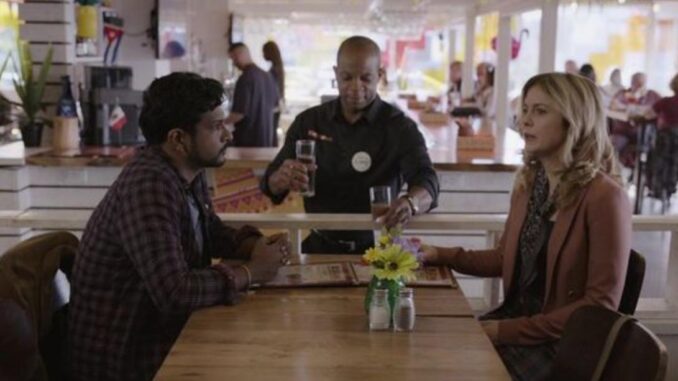
Can a Cliffhanger Doom Your Favorite Sitcom?
Ghost stories have captivated us for generations. But when spooky cliffhangers sneak their way into sitcoms, things can get messy. Imagine this: You’re hooked on a hilarious series, laughing along with familiar characters, and suddenly, a haunting cliffhanger throws everything off balance. Could such twists doom a beloved sitcom? Let’s dive into the risks and rewards of ghostly cliffhangers and how they can make or break a show.

Why Do Shows Use Cliffhangers?
Cliffhangers keep viewers on the edge of their seats, fostering suspense and ensuring they’ll return for the next episode. They’re like the TV version of a page-turner. But when used excessively or awkwardly in genres that aren’t traditionally suspenseful—like sitcoms—they can backfire.
What Are Cliffhangers, and Why Are They So Addictive?
A cliffhanger leaves a plot unresolved, tempting viewers with the promise of closure in the future. They can be a genius move, keeping the audience hooked as they eagerly await the next twist. But in sitcoms, which thrive on laughter and lighthearted plotlines, these suspenseful elements can feel out of place.
When Ghostly Cliffhangers Go Wrong
Ghostly themes and cliffhangers can bring excitement and eerie suspense, but they’re also risky in the realm of comedy. If the suspense or supernatural twist feels forced, it might confuse or alienate the audience, turning a beloved comedy into an odd, genre-blending experiment.
Can Ghosts and Sitcoms Ever Mix?
Ghosts are often better suited for thrillers or horror series, where suspense is welcomed and expected. In sitcoms, however, ghostly appearances and dark twists can be disruptive, even if they’re played for laughs.
The Appeal of Haunting Twists in Sitcoms
But not all ghostly cliffhangers are doomed to fail! When executed with a deft comedic touch, a ghost twist can add fresh excitement to a show’s storyline, breaking away from predictable plots and entertaining audiences with an unexpected blend of comedy and horror.
Why Do Some Sitcoms Succeed with a Supernatural Twist?
A ghostly cliffhanger in a sitcom can be successful if it plays into the show’s humor. The key is to balance the spooky with the silly, ensuring that the haunting twist doesn’t overshadow the show’s comedic foundation.
The Cliffhanger Curse: Why Many Sitcoms Lose Their Charm
The cliffhanger curse haunts many shows when suspenseful endings become a crutch for maintaining viewership. When a sitcom suddenly leans heavily on unresolved plots or spooky twists, it risks losing its comedic focus, potentially leading to a “jumping the shark” moment.
What Is “Jumping the Shark,” and How Does It Happen?
“Jumping the shark” is when a show takes a drastic, often outlandish turn to keep viewers interested. This move can cause fans to feel alienated, turning a once-loved show into a confusing mess.
When Cliffhangers Become Gimmicks
Not every cliffhanger is a tool for clever suspense. In sitcoms, they can easily slide into gimmicky territory, offering shock value without meaningful storytelling. Ghostly twists should serve the plot, not distract from it.
Are Ghostly Cliffhangers Just Cheap Tricks?
Adding ghosts for the sake of a twist risks losing the audience’s trust. Instead, if supernatural elements are naturally woven into the storyline, they can enrich the show, making it memorable rather than baffling.
Top Sitcoms That Embraced Ghosts—and Failed
Some sitcoms have bravely stepped into the supernatural, only to find that these cliffhangers led them to ruin. Here’s a quick look at a few popular shows that stumbled when ghosts came knocking.
- Happy Days – Infamous for its “jump the shark” moment, the show introduced ridiculous elements that derailed its charm.
- The Brady Bunch – A failed attempt to blend in a ghostly subplot alienated viewers.
- Friends – Although “Friends” avoided ghosts, other shows have made this misstep, falling flat with an awkward blend of genres.
Why Do These Shows Often Backfire?
When sitcoms try to include elements from other genres, they risk losing their unique tone. Without careful balancing, these ghostly cliffhangers can feel out of place and forced.
How to Avoid the Cliffhanger Trap
So, can sitcoms introduce suspense without falling into the cliffhanger curse? By using these spooky twists sparingly and with purpose, sitcoms can maintain their comedic identity while adding a hint of intrigue.
Can Sitcoms Successfully Integrate Ghosts?
With the right approach, sitcoms can welcome ghostly themes without derailing the show. The key is subtlety and timing—an occasional ghostly cliffhanger can be hilarious if it’s rooted in humor and doesn’t overshadow the lighthearted core.
Mastering the Art of the Ghostly Cliffhanger
To master ghostly cliffhangers, sitcom writers must understand the show’s unique tone and audience. Instead of using these cliffhangers as gimmicks, they should enhance the storytelling, ideally bringing the audience closer to the characters.
What Does a Successful Ghostly Cliffhanger Look Like?
A successful ghostly twist adds dimension to the story, deepening characters and driving plot without overstepping its comedic foundation. This type of cliffhanger enriches the show and keeps fans invested without losing the light-hearted humor they love.
Wrapping Up: Are Ghostly Cliffhangers Worth the Risk?
Ultimately, the ghostly cliffhanger is a high-stakes gamble. When done right, it can add depth and excitement, breaking the monotony of traditional sitcom plots. But if done poorly, it risks alienating fans and veering into strange, genre-blending territory that few comedies survive.
Should Your Sitcom Dare to Haunt?
In the end, ghostly cliffhangers are a double-edged sword. They can be the perfect twist to refresh a storyline or the fatal flaw that drags it down. It all depends on execution. If done thoughtfully, with the audience’s expectations in mind, these spooky twists can be a delightful surprise. But sitcom writers beware—going ghostly could send your series straight into sitcom purgatory.
